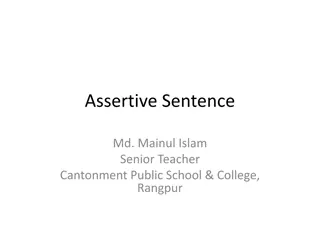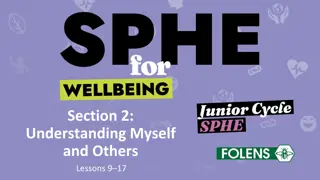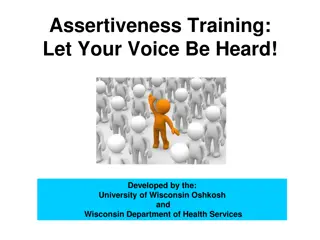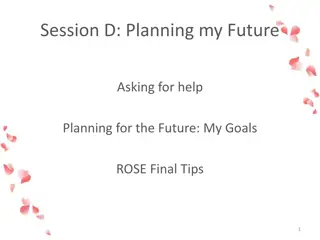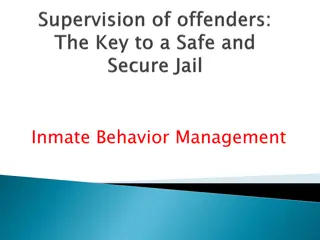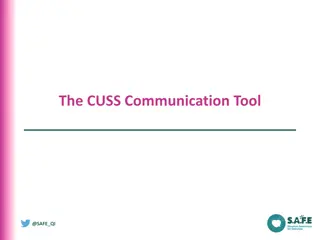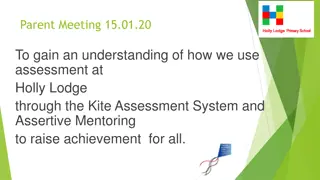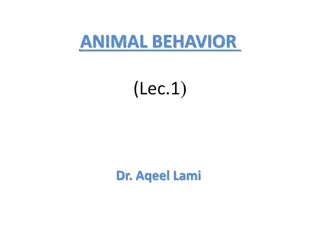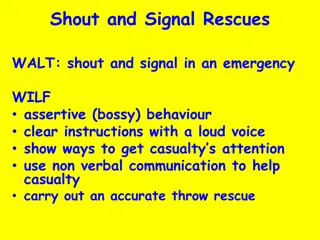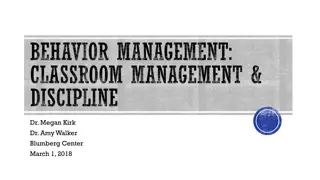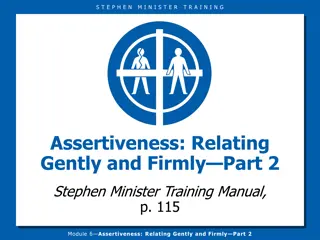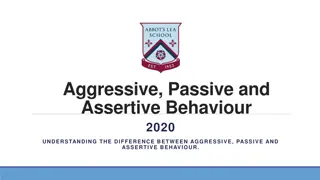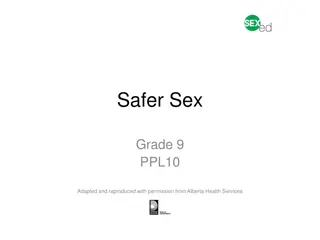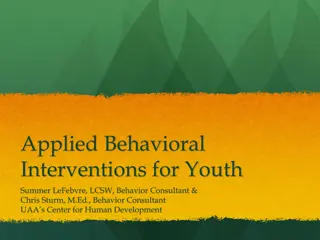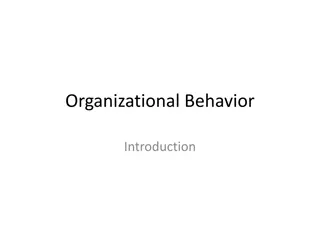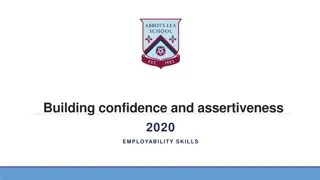Function Based Thinking
Function-based thinking in Missouri Schoolwide Positive Behavior Support, emphasizing data-based decision-making, mission clarity, and effective teaching practices. Understand how behavior is related to the environment and how environmental interventions play a key role in shaping expected behaviors
6 views • 27 slides
Mastering Assertive to Exclamatory Sentences: A Comprehensive Guide
Dive into the world of changing sentence structures with a focus on transforming assertive sentences to exclamatory ones. Explore the importance of using exclamatory sentences to express strong emotions and learn various examples and models to enhance your understanding and mastery of this skill.
2 views • 25 slides
Sentence Transformation Guidelines and Exercises for B.A. II Semester English
Understand the concept of sentence transformation to alter sentence forms without changing meanings. Learn various types of transformations like affirmative to negative, interrogative to assertive, and more. Practice exercises provided for hands-on learning.
1 views • 11 slides
Assertive to Interrogative: English Grammar Exercises and Practice
Enhance your English grammar skills with exercises on changing assertive sentences into interrogative ones. Learn how to transform sentences using auxiliary verbs, modal verbs, and without auxiliary verbs through practical examples and practice questions. Improve your sentence structure and comprehe
2 views • 24 slides
Addressing Predatory Behavior in the Fellowship
Predatory behavior, especially towards vulnerable members, is a concerning issue in the fellowship. This behavior includes unwelcome advances, exploitation of power dynamics, and institutional sexism. The discussion on predatory behavior necessitates honest dialogue and a united approach for a safer
3 views • 13 slides
Understanding Sentence Types and Structure
Explore the types of sentences - Assertive, Interrogative, Declarative, Imperative, and Exclamative, each serving a unique purpose in communication. Learn about sentence patterns, word order, and examples for better comprehension.
4 views • 8 slides
Section 2: Understanding Myself and Others
Explore the nuances of passive, aggressive, and assertive communication styles. Learn how to express your feelings effectively, use verbal and nonverbal communication skills, and enhance your overall communication abilities. Engage in interactive activities to improve your communication techniques a
3 views • 71 slides
Assertiveness Training: Let Your Voice Be Heard
Assertiveness Training: Let Your Voice Be Heard is a program developed by the University of Wisconsin Oshkosh and Wisconsin Department of Health Services. It focuses on understanding the difference between passive, aggressive, and assertive communication techniques, learning to use assertive techniq
0 views • 9 slides
Empowering Women: Assertiveness Training and Overcoming Barriers
This content discusses assertiveness training for women, focusing on communication skills, handling interpersonal disputes, understanding assertive behavior, and overcoming barriers to assertiveness. It emphasizes the importance of women asking for help when needed, challenging societal expectations
0 views • 18 slides
English Transformation Rules: Assertive to Interrogative with Examples
Learn the rules of transforming assertive sentences into interrogative sentences in English grammar. Understand the different scenarios and examples for the transformation process. Enhance your skills in using interrogative sentences in various situations while maintaining the original meaning. Dive
1 views • 23 slides
Understanding Self-Esteem and Ways to Improve It
Self-esteem is our perception of ourselves, impacting how we navigate life. Healthy self-esteem fosters positivity, while low self-esteem can be detrimental. Various factors, like childhood experiences, contribute to low self-esteem, but steps can be taken to improve it. Building positive relationsh
0 views • 14 slides
Understanding Consumer Behavior in Marketing
The design of a marketing program starts with understanding consumer behavior. Consumers, as the end users, play a crucial role in shaping market trends. Producers seek insights into consumer personas, market behaviors, and influencing factors. Management focuses on the consequences of consumer beha
2 views • 26 slides
Understanding Psychology: The Science of Behavior and Mental Processes
Psychology is the scientific study of behavior and mental processes. Psychologists study both observable behavior and private mental processes. The primary goals of psychology are to describe, understand, predict, and control behavior. Different branches of psychology, such as applied psychology, cl
2 views • 29 slides
Mastering Communication Styles for Effective Diplomacy
Explore different communication styles such as passive, aggressive, passive-aggressive, and assertive to enhance your diplomatic skills. Learn how each style influences interactions and strategies for effective communication in various scenarios.
0 views • 10 slides
Understanding Inmate Behavior Management in Correctional Settings
Inmate Behavior Management in correctional facilities involves supervising inmates, implementing corrective discipline, and fostering a fair and consistent environment. It emphasizes the importance of behavior management plans, identifying undesirable traits in supervision, and passing educational a
0 views • 19 slides
Understanding Human Behavior: Foundations and Factors
Human behavior is a multifaceted subject influenced by genetic makeup, culture, and individual values. It encompasses both overt actions and covert thoughts, a product of the individual and environmental factors. Psychologists study behavior from visible (overt) actions like playing football to inne
0 views • 20 slides
Understanding Different Types of Sentences
Learn about the four types of sentences - Assertive, Imperative, Interrogative, and Exclamatory. Understand their characteristics and see examples to identify each type correctly. Enhance your knowledge of sentence structure and punctuation rules.
0 views • 8 slides
Effective Communication Tool for Addressing Concerns: The CUSS Technique
The CUSS Communication Tool @SAFE_QI is a technique that promotes a graded assertiveness approach to addressing concerns in healthcare settings. It provides a structured method for individuals to escalate their concerns if not initially addressed, using trigger words like Concern, Uncomfortable, unS
0 views • 8 slides
Understanding Normal and Abnormal Behavior: Perspectives and Definitions
Normal behavior varies from person to person and society, influenced by individual preferences and societal norms. Abnormal behavior is characterized by an inability to function effectively or personal discomfort. The concept of normality and abnormality in psychology raises complex questions about
2 views • 8 slides
Transformation of Exclamatory Sentences to Assertive: Rules and Examples
Learn how to transform exclamatory sentences into assertive sentences with clear rules and examples. Find out how to change the tone from enthusiastic or emotional to more straightforward and factual.
0 views • 11 slides
Enhancing Achievement Through Assessment at Holly Lodge: Kite Assessment System & Assertive Mentoring
Gain insight into how assessment strategies at Holly Lodge, including the Kite Assessment System and Assertive Mentoring, are utilized to elevate student achievement. Explore robust target setting, targeted teaching, progress tracking, and child-inclusive goal setting to support student success. The
0 views • 15 slides
Understanding Human Behavior: Insights for Social Workers
This material delves into the intricacies of human behavior, exploring factors influencing behavior such as heredity, environment, intelligence, needs, and motives. It covers the concept of human behavior, stages in life from conception to old age, and theories of human development by eminent psycho
2 views • 71 slides
Understanding Animal Behavior and Ecology
Animal behavior encompasses a range of activities such as feeding, breeding, and social interactions. Ethology focuses on studying behavior in natural environments, while behavioral ecology examines ecological aspects like predator-prey interactions. Sociobiology delves into the evolution of social
3 views • 5 slides
Emergency Rescue Techniques and Safety Tips
Learn how to shout and signal in emergencies, apply assertive behavior, give clear instructions, and use non-verbal communication to rescue others. Understand the dangers of outdoor water locations, identify ways to help someone in distress, and practice throw rescue techniques. Enhance your skills
0 views • 8 slides
English 2nd Paper Class for HSC/Alim - Assertive, Interrogative, Exclamatory Sentences Practice
Join Sabina Yeasmin's English 2nd Paper class at Baridhara Nazmul Ulum Alim Madrasah, Dhaka for HSC/Alim students. Practice converting assertive to exclamatory and interrogative sentences. Explore examples like "Anger is nothing but a vice" transformed to "Is anger anything but a vice?" Learn how to
0 views • 11 slides
Understanding Behavior Management in Classroom Settings
Explore the essential topics of behavior management, classroom strategies, and discipline in educational settings. Delve into the functions of behavior, impact of trauma on learning, and effective management techniques. Learn how to identify underlying reasons for student behaviors, discuss behavior
0 views • 76 slides
Assertiveness Training for Stephen Minister: Relating Gently and Firmly
Learn about assertiveness training for Stephen Ministers in Module 6, where topics include responding to care receiver requests, making assertive requests, and skill practice for making and responding to requests. Explore the experiences of being assertive, the challenges faced, and the importance o
0 views • 21 slides
Targeting Emotions to Facilitate Behavior Change in Older Adults
Efforts in changing health behavior have traditionally focused on social and cognitive factors, but recent evidence highlights the importance of affective states in decision-making and behavior change. Janey Peterson discusses the role of emotions in achieving and sustaining behavior change to benef
0 views • 11 slides
Grading Criteria for Effort and Behavior in Educational Reporting
Effort and behavior in educational settings are evaluated based on criteria ranging from Excellent to Causing Concern. Pupils demonstrating excellent behavior show respect, responsibility, and positive engagement in learning. Those with good behavior exhibit cooperation and respect for others, albei
0 views • 9 slides
Understanding Aggressive, Passive, and Assertive Behavior in 2020
Aggressive behavior is reactionary and impulsive, often leading to rule-breaking and violence. Passive behavior involves failing to express thoughts and feelings, allowing others to disregard your rights. Assertive behavior means standing up for your rights in a calm and positive manner, without bei
0 views • 11 slides
Building Assertiveness Skills: A Guide to Effective Communication
Explore the concept of assertiveness, learn what it means to be an assertive person, and discover the characteristics of assertive individuals. This guide provides practical tips on how to become more assertive, including strategies for open communication, active listening, and conflict resolution.
0 views • 15 slides
Safer Sex Practices and Assertive Communication Techniques for Teens
Explore safer sex practices such as abstinence, limiting partners, and proper contraceptive use to reduce risks of STIs, pregnancy, and emotional impacts. Learn about passive, aggressive, and assertive communication styles, emphasizing the importance of assertive communication in expressing feelings
0 views • 9 slides
Understanding Applied Behavior Analysis (ABA) for Youth Interventions
Applied Behavior Analysis (ABA) is a science focusing on improving human behavior by increasing desired behaviors, teaching new skills, and generalizing behaviors. ABA emphasizes observable behaviors, measurement of behavior change, and the use of interventions in various settings like classrooms an
0 views • 25 slides
PBIS Expectations and Behavior Flowchart
The PBIS flowchart outlines behavior expectations and interventions for minor and major incidents in a school setting. It covers disrespectful behavior, disruption, defiance, property damage, theft, possession of weapons, and more. The flowchart guides teachers and staff on managing and addressing s
0 views • 6 slides
Managing Acting-Out Behavior: A Staff Development Program Review
This review discusses a staff development program created by Geoffrey Colvin, Ph.D., from the University of Oregon, focusing on preventing and managing acting-out behavior in students with emotional disturbance or behavior disorders. The program includes video presentations, strategies for behavior
0 views • 22 slides
Understanding Organizational Behavior and Individual Behavior
Organizational Behavior (OB) is a multidisciplinary field that combines knowledge from various disciplines to study and manage organizations effectively. It emphasizes the application of this knowledge to enhance organizational effectiveness and the well-being of participants. OB is a useful concept
0 views • 38 slides
Function-Based Behavior Support Plans: A Comprehensive Guide
Explore the process of developing Function-Based Behavior Support Plans (BSP) using Functional Behavioral Assessment (FBA). Understand the concepts of function and functional behavior assessment, learn how FBA/BSP fits within a multi-tiered support system, and practice developing BSP for students. D
0 views • 74 slides
Transformation of Sentences into Assertive and Exclamatory Forms
Learn how to transform assertive sentences into exclamatory form and vice versa through examples and visual aids. Explore the rules and structures behind these sentence transformations to enhance your writing skills.
0 views • 9 slides
Examples of Assertive to Exclamatory Sentences in English
Explore examples of transforming assertive sentences into exclamatory sentences in English. Practice converting statements to exclamations to enhance your language skills. Understand the nuances of sentence structure and punctuation to effectively convey emotions and emphasis.
0 views • 13 slides
Enhancing Confidence and Assertiveness in Employability Skills
Understanding the concepts of confidence and assertiveness is crucial in developing employability skills. Assertiveness involves standing up for oneself while respecting others. Tips for gaining confidence include visualization, self-affirmation, facing fears daily, and challenging your inner critic
0 views • 7 slides





